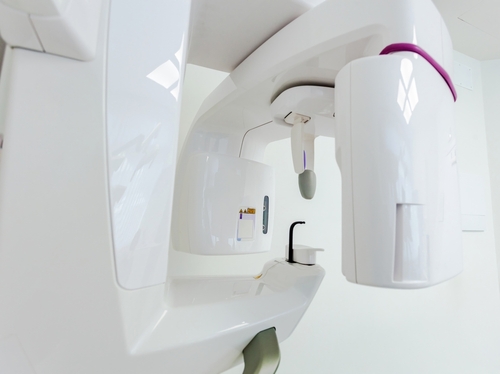If you’ve looked into getting dental implants before, you know the importance of a strong and healthy jawbone. These titanium tooth replacements require ample jaw structure for support. Without it, you’ll need additional procedures to rebuild lost bone. Unfortunately, most patients with missing teeth have a diminished jawbone, as tooth loss is a direct cause of jawbone loss over time. To determine if you’re eligible for dental implants, visit Fine Dental Care! At our office, we use a Dental CBCT scan to assess the quality of your jawbone. If you have enough bone to support dental implants, we’ll then create a custom treatment plan to restore your smile!
Why Jawbone Health Matters
Your jawbone relies on stimulation from your natural teeth to stay healthy and full. This stimulation is the result of tooth roots, hidden below your gum line, pressing into your bone every time you bite or chew! After losing teeth, your jawbone loses stimulation and gradually shrinks.
However, dental implants require bone structure to stabilize! Without enough bone, patients can’t replace their missing teeth with implants. At Fine Dental Care, we offer additional procedures that rebuild lost bone structure. But most patients prefer to skip these bone augmentation procedures, as they are typically time-consuming and expensive. Instead, patients often opt for mini dental implants!
Mini implants are a smaller, less invasive alternative to traditional dental implants. Unlike traditional titanium screws, mini implants have a one-piece design, allowing us to place them in a single appointment. Additionally, thanks to their tiny diameter, mini implants require less bone to stabilize! Even patients who’ve experienced bone loss may be eligible for mini implant treatment without additional procedures.
The only way to know for sure you’re a candidate for dental implants is to come in for a free consultation and a dental CBCT scan.
How a CBCT Scan Works
 CBCT stands for Cone Beam Computed Tomography. This X-ray produces a 3D digital image of your smile, giving us a 360-degree view of your bone structure. By manipulating the image, we will closely assess your jaw and determine whether mini implants can stabilize in your bone.
CBCT stands for Cone Beam Computed Tomography. This X-ray produces a 3D digital image of your smile, giving us a 360-degree view of your bone structure. By manipulating the image, we will closely assess your jaw and determine whether mini implants can stabilize in your bone.
A CBCT machine is a large structure that slowly rotates around your head to get a clear, 3D image. The X-ray takes only a few seconds, and the amount of radiation released during the scan is significantly lower than that of other CT scans.
With a faster, safer process than other scans (and a much more detailed image), dental CBCTs are the best option for implant planning.
Using a Dental CBCT To Plan Your Implants
To begin the implant process, a dental CBCT is essential. This 3D digital image allows us to determine your eligibility and assess any potential issues we may encounter when placing your implants.
In some cases, vital structures like your sinuses may be in the way of implant placement. A dental CBCT scan allows us to spot these issues before implant placement, and plan accordingly! Using a sinus lift procedure, we can gently lift your sinuses upward and fill the remaining space with bone grafting material to strengthen your jaw. Once your bone is healed, we’ll then carefully place your implants and restore your smile.
Additionally, we use your 3D digital image to plan the optimal place for your implants. By closely inspecting your X-ray, we can determine which area of your bone is strong enough to support a dental implant. Not only does this reduce the number of errors that a dentist may make, but it also increases the likelihood of a successful outcome!
With a dental CBCT to help plan your implant case, we provide you with a safe and effective implant placement that restores your smile.
Visit Fine Dental Care in Wayne, NJ, for Your Dental CBCT Scan
Dental implants require ample bone structure for support. Thankfully, a dental CBCT helps us determine your eligibility and plan your implant placement for the optimal outcome! Visit Fine Dental Care for a free consultation as soon as possible to find out if you’re eligible for mini implant treatment.
Follow us on Instagram and Facebook to learn more about the mini implant process.
